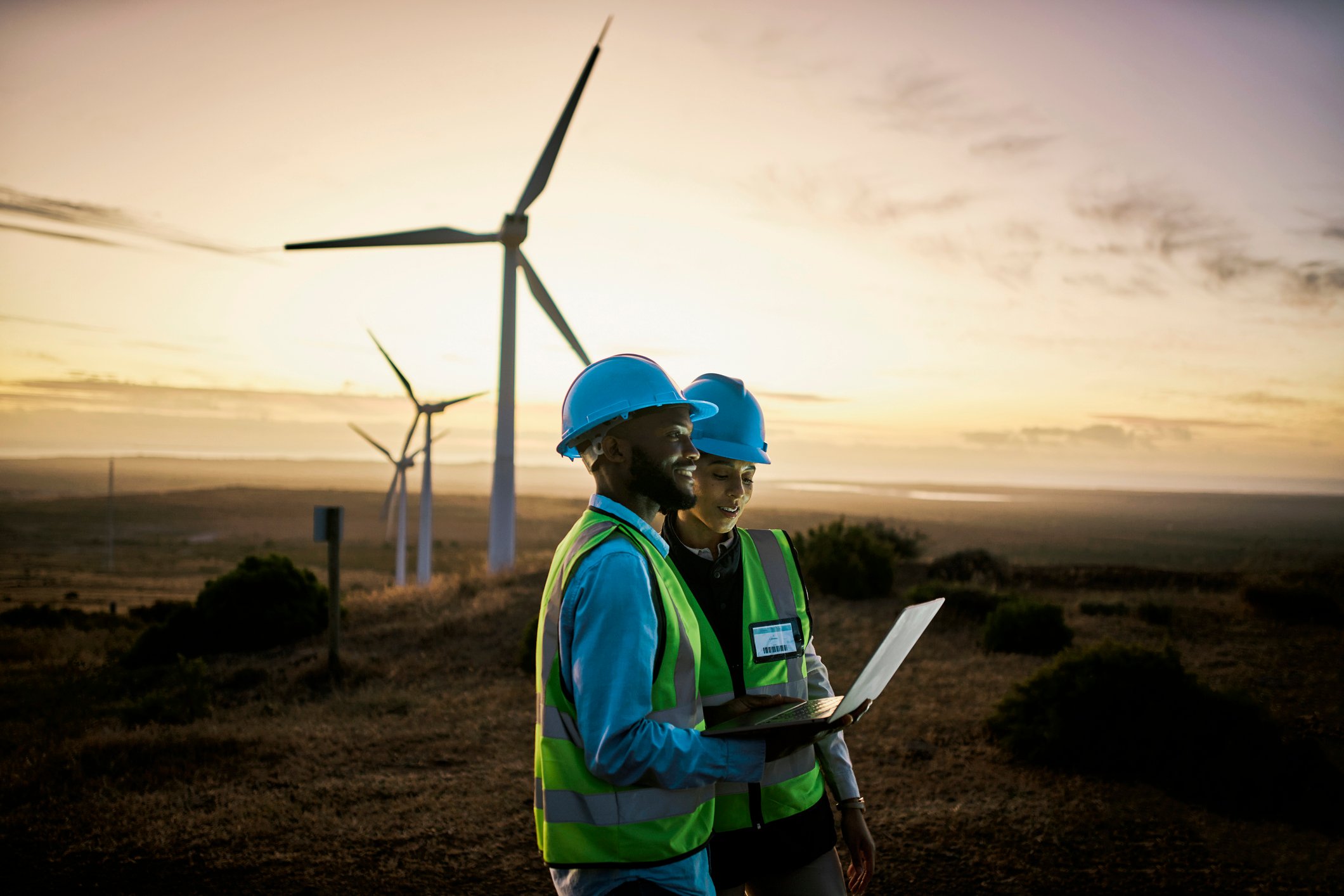What is a Renewable Energy Engineer?
Renewable energy engineers contribute to the development, implementation, and optimization of renewable energy systems, such as from geothermal, hydroelectric, wind, electrical and solar energy sources. They apply their expertise in engineering principles, software automation, and innovative problem-solving to enhance the performance and reliability of alternative energy engineering technologies. Their work is crucial to accelerating the global transition to clean and sustainable energy sources.
Ready to take the next step?
Apply now for a job as a Renewable Energy Engineer!
Petroleum Engineer
Location: Midland, TX
Branche: Conventional Energy
Expertise: Planning & Testing
Experience: 3 years
Design, plan, and provide engineering execution support to wellwork operations post-completion, inclusive of drillouts & initial completions. Liaise with Production Engineering to provide cost & scope for initial completion installation. Interface with Development & Completion engineering to understand well designs & challenges on a well-by-well basis. Develop procedures and provide design input to artificial lift systems & drillout operations. Interface with Integrated Scheduling & Operations Team for rig scheduling, execution support, and troubleshooting Liaise with specialist contractors & suppliers for cost and equipment readiness Monitor daily progress of wellwork operations, track daily costs, and recommend cost-effective changes where necessary; travel to company designated sites when necessary Support completion spend forecasting and budget preparation. Track, analyze, and continually improve drillout execution efficiency; manage contractor performance; steward and analyze Wellview data quality
PSA Engineer - Generation
Branche: Infrastructure
Expertise: IT & Shared Services
Experience: 0 years
We are supporting a leading organization in the power and utilities sector delivering mission-critical Energy Management System (EMS) solutions for generation operations. This role focuses on administering, optimizing, and supporting power system applications used in real-time grid operations and control center environments. You will play a critical role in maintaining system availability, deploying fixes in live environments, and supporting advanced generation and power system applications.
Electrical Engineer
Location: Safford
Branche: Mining
Expertise: Quality Management
Experience: 3 years
Duties: Provide technical advice and guidance for assigned electrical engineering projects. Assist Senior Engineer in developing Electrical Engineering projects utilizing new technology to constantly upgrade and improve site safety, efficiencies, cost controls, quality controls and protection of the environment. Review, investigate and develop appropriate recommendations regarding assigned Engineering projects Manage small to medium site construction, expansion or modification projects, and assists the Senior Engineer on large/complex site planning/construction, expansion or modifications Administer contracts with vendors for the provision of services and equipment Develop working knowledge of local, state and federal regulations appropriate to area of assignment Assist the Senior Engineer in contributing to site strategic planning and budgeting efforts for designated Engineering areas Develop and evaluate AFE's (Authorization for Expenditure) for capital funding requests May represent the site on company sponsored steering committees, task forces, or teams Perform other duties as required Criteria/Conditions: Personal protective equipment is required when performing work in a mine, outdoor, manufacturing or plant environment, including hard hat, hearing protection, safety glasses, safety footwear, and as needed, respirator, rubber steel-toe boots, protective clothing, gloves and any other protective equipment as required. Candidates may be required to pass a medical exam. Candidates must pass all required training and/or testing. Employees may be required to work a non-standard schedule, which may include shift work (other than day shift) at a 24/7, 365-day operation. What We Require Candidates may be required to pass a medical exam. Candidates must pass all required training and/or testing. Employees may be required to work a non-standard schedule, which may include shift work (other than day shift) at a 24/7, 365-day operation. Our client promotes a drug/alcohol-free work environment using mandatory pre-employment drug testing and on-going drug and alcohol testing, as allowed by applicable laws.
Power Electronics Engineer
Location: Montréal
Branche: Infrastructure
Expertise: Research & Development
Experience: 3 years
Power Electronics Specialist - Power Converter Design Montreal, Quebec Introduction Brunel is seeking a Power Electronics Engineer to support one of our large industrial and infrastructure clients in the final design, integration, and validation of power converter systems. This role will contribute to the successful delivery of a power electronics prototype within a time-sensitive development phase. The position requires a hands-on engineer with strong experience in power converter control design and laboratory validation, capable of working closely with electronics and software engineering teams in a lab-based, delivery-focused environment. Responsibilities Lead and execute the design and refinement of power electronic converters supporting industrial and energy applications Provide technical ownership for analysis, simulation, and validation of power converter performance against system requirements Support the integration of power electronics within larger electrical and electromechanical systems, ensuring reliable system-level operation Execute and support laboratory testing, troubleshooting, and performance optimization to meet functional and delivery targets Support prototypes bring-up, verification, and commissioning activities during critical development phases Collaborate closely with cross-functional engineering teams, including electronics, controls, software, and systems engineers Contribute to technical documentation, design reviews, and engineering decision-making in support of project milestones Requirements Bachelor's degree or higher in Electrical Engineering or a closely related discipline 5-7+ years of directly relevant experience in power electronics and power conversion Demonstrated, day-to-day experience in the design and validation of power converters (not a general electrical engineering role) Proven experience taking ownership of power converter control design Experience with microcontroller-based control platforms STM32 preferred; comparable MCU platforms will be considered Strong, hands-on experience with laboratory testing, debugging, and validation of power electronics hardware Ability to contribute effectively and independently in a delivery-driven, prototype-focused development environment Willingness to work full-time on-site initially, particularly during testing, debugging, and validation phases Ability to work independently while collaborating effectively with cross-functional engineering teams
Engineering Technician - BESS
Location: Houston
Branche: Renewable Energy
Expertise: HR & Recruiting
Experience: 0 years
Onsite, 5 days per week (local candidates only) Available locations: Overland Park, KS Denver, CO Houston, TX Jacksonville, FL Orlando, FL Employment Type: Contract-to-Perm 1 position available We are supporting large-scale Battery Energy Storage System (BESS) projects and are seeking an experienced Civil Staff Engineering Technician to support civil design and engineering teams. This role focuses on the development of site grading, drainage, and utility plans using Autodesk Civil 3D (primary) and/or Bentley MicroStation. You will play a key role in producing high-quality civil deliverables for energy and infrastructure projects. Key Responsibilities Support civil engineering and design teams by developing and modifying technical deliverables Create and update grading plans, drainage layouts, and utility designs for BESS and energy projects Develop proposed grading surfaces and plan sets using Autodesk Civil 3D Apply standard engineering principles and established design practices to moderately complex designs Produce and maintain drawings, models, and documentation using CAD and 3D design tools Review design inputs to ensure accuracy, consistency, and compliance with project standards and codes Perform design calculations, material quantity take-offs, and estimates Coordinate with multidisciplinary design teams to support project development Provide technical guidance to junior technicians and support quality reviews of deliverables Assist with scheduling, work assignments, and document control as needed Support field or construction-related activities when required Advanced Autodesk Civil 3D experience (required), including: Proposed grading surfaces Site layout and plan development Strong understanding of civil design standards, document control, and quality processes Experience producing deliverables compliant with applicable codes and project standards Ability to independently handle complex technical assignments within area of expertise Experience reviewing the work of others and ensuring quality and consistency Proficient with CAD-based design workflows and digital engineering tools Strong communication skills and ability to collaborate with internal project teams Preferred Qualifications Diploma or Certificate (required) Associate Degree in Drafting, Engineering Design, or related technical discipline (preferred) Experience supporting energy, power, or infrastructure projects (BESS experience strongly preferred) Typically 5+ years of relevant civil design or engineering technician experience Ability to work onsite full-time in one of the listed locations Must be eligible to complete standard pre-employment requirements, which may include: Background check Drug screening Motor vehicle records check (where applicable) Why This Role Long-term opportunity with contract-to-permanent potential Work on high-visibility utility-scale BESS and energy projects Join experienced engineering teams supporting major infrastructure initiatives
Engineering Superintendent
Location: Val-d'Or
Branche: Mining
Expertise: Production & Manufacturing
Experience: 5 years
Introduction Brunel is currently looking for an Engineering Superintendent for one of our mining clients located near Val-d'Or, Québec. As an Engineering Superintendent, you will lead and manage the full engineering function for an underground mining operation. Reporting to the General Manager, you will provide strategic and technical leadership to engineering teams, oversee critical projects, ensure compliance with safety and regulatory standards, and support production objectives. This role plays a central part in driving operational performance, technical excellence, and long-term mine development planning. Responsibilities Provide leadership and direction to the engineering department to support production and operational objectives. Supervise and mentor engineering teams, including technicians, engineers‑in‑training, and professional engineers. Lead health and safety prevention initiatives within the engineering group. Develop, update, and implement departmental procedures and engineering standards. Prepare and manage the engineering department's annual budget. Oversee the preparation of technical reports, performance monitoring, and monthly engineering updates. Maintain strong communication and collaboration with other operational departments. Manage major engineering projects such as area development, ventilation planning, and infrastructure design. Collaborate with external consultants on studies, audits, and specialized projects. Act as a Qualified Person (QP) for annual reserve calculations and related reporting. Support technical specialists (ventilation, blasting, ground control, backfill) in optimizing their respective programs. Ensure compliance with regulatory requirements, internal standards, and industry best practices. Participate in short‑, medium‑, and long‑term mine planning activities. Contribute to the design of development headings, infrastructure, and production areas. Support the application of laws, regulations, standards, and procedures relevant to mine engineering. Perform other related duties aligned with engineering management responsibilities. Qualifications: Bachelor's degree in Mining Engineering. Minimum 15 years of direct experience in underground mining operations. Member in good standing with the Ordre des ingénieurs du Québec (OIQ). Experience supervising mining operations considered an asset. Proficiency with Deswik, Ventsim, and the Microsoft Office suite. Strong knowledge of both long‑hole and conventional mining methods. Completion of FMTM modules (1-5, 7). Valid General Explosives Permit. Strong technical and organizational leadership capabilities. Excellent communication skills in both French and English. Collaborative mindset and ability to thrive in a dynamic, fast‑moving environment. Commitment to health, safety, operational performance, and engineering excellence. Critical thinking, rigor, and strong strategic analytical skills.
Project Engineer - DMS / EMS
Branche: Infrastructure
Expertise: IT & Shared Services
Experience: 0 years
We are supporting a leading organization in the power and utilities sector delivering mission-critical grid and energy management solutions. This role focuses on the implementation, configuration, and support of Energy Management System (EMS) and Distribution Management System (DMS) platforms used by utilities and system operators in real-time control center environments. You will play a key role in deploying and maintaining complex grid applications that support generation, transmission, and distribution operations. Key Responsibilities Implement, install, configure, customize, and upgrade DMS / EMS systems for utilities and system operators Support control center environments, ensuring system reliability, redundancy, and availability Configure and maintain databases and system integrations supporting EMS/DMS platforms Work closely with engineering, operations, and project teams throughout system delivery and upgrades Support system automation, configuration, and troubleshooting across enterprise environments 5+ years of experience implementing and supporting DMS / EMS systems for utilities or system operators Hands-on experience with one or more of the following platforms: GE PowerOn Reliance (XA21) GE eTerra Siemens Spectrum Power OSI Monarch or similar energy management products Strong programming experience with C/C++ and Java Experience working with Oracle and/or SQL Server databases Experience with basic scripting for configuration or automation Solid understanding of power system fundamentals, including: Generation Transmission Distribution Experience with network applications such as: Power Flow Contingency Analysis State Estimation Load Forecasting Hands-on experience with utility communication protocols, including: IEC 101 / 104 DNP3 Modbus ICCP Experience working across Linux and Windows environments Knowledge of network security, redundancy, and failover mechanisms in control center systems
Facilities Engineer / Specialist I
Location: Spring
Branche: Conventional Energy
Expertise: HR & Recruiting
Experience: 3 years
* Facilitate and coordinate discipline engineering technical work products* Coordination and communication of various issues among the company's and contractor's engineering team that affect the discipline engineering design, safety, and regulatory compliance of the work* Evaluate / comment work performed by the Contractor and sub-contractors to insure that the work is being executed in accordance with Company specifications, standards, and regulatory requirements. Includes review of discipline design drawings and documents* Identify and assess deviations to Contract Technical Specifications and regulatory requirements; ensure that such deviations will be processed according to Company procedures; maintains Deviation Control Log.* Steward discipline engineering queries from the Contractor and sub-contractors as well as technical information requests* Keep Lead Engineer or Engineering Manager informed of discipline engineering progress, deviations, and execution concerns* Participate in discipline engineering reviews at Contractor's and subcontractor's locations* Drives and promotes capital efficiency in engineering design* Support internal engineering general interest or Global Practice initiatives as requested by Supervisor
Senior Engineering Manager - Utility-Scale Solar & BESS
Location: Austin
Branche: Renewable Energy
Expertise: HR & Recruiting
Experience: 5 years
Key responsibilities include: Lead all electrical engineering activities for utility-scale solar and BESS projects across development, design, construction, commissioning, and operations Provide technical direction and subject-matter expertise for both new projects and existing operating assets Collaborate with project management and procurement teams to support on-time and cost-effective delivery Coordinate engineering activities with EPC contractors, equipment vendors, utilities, and regulatory authorities Oversee engineering studies, feasibility assessments, and detailed design reviews Ensure compliance with NEC, IEEE, safety regulations, environmental standards, and internal engineering requirements Own MV/HV systems, substations, protection & control, and grid interconnection scope Support ERCOT interconnection processes and Texas grid requirements Monitor plant performance and recommend optimization strategies Review and approve technical documentation, drawings, reports, and specifications Evaluate and implement new technologies to improve plant efficiency, reliability, and sustainability Provide technical leadership to internal engineering teams and external partners
Staff Engineering Technician
Branche: Renewable Energy
Expertise: Planning & Testing
Experience: 0 years
The Staff Engineering Technician will support civil engineering design efforts within the Clients Governments & Water Utilities (G&Wu) group. This role focuses on water and wastewater infrastructure projects, including site development, drainage, grading, and utilities. The position involves creating and modifying technical design deliverables using Autodesk Civil 3D and Bentley MicroStation, working closely with engineering and design teams.
What does a Renewable Energy Engineer do?
Renewable energy engineers analyze site conditions, assess resource availability, and conduct feasibility studies to determine the most suitable technology for a specific location. They are also responsible for system design, equipment selection, and performance optimization. They specifically utilize their technical expertise to design energy systems, including solar panels, wind turbines, and energy storage solutions, ensuring optimal energy production and integration into existing power grids.
The role of a Renewable Energy Engineer
In addition to design and optimization, renewable energy engineers contribute to the maintenance and operation of renewable energy systems. They monitor system performance, identify potential issues, and implement maintenance plans to maximize energy output and minimize downtime. They also stay abreast of advancements in renewable energy technologies and regulatory frameworks to ensure compliance and foster innovation.
Renewable energy engineers collaborate with multidisciplinary teams, including project managers, environmental specialists, and regulatory authorities, to ensure the successful implementation of renewable energy projects. They may also engage in community outreach and education initiatives to promote renewable energy adoption and sustainability practices.
Required skills for a Renewable Energy Engineer
To do well in this career, renewable energy engineers must possess a strong understanding of renewable energy technologies, energy conversion systems, and grid integration. Employment opportunities are on the rise for renewable energy engineers and can be found in renewable energy companies, energy consulting firms, research institutions, and government agencies.
Common Renewable Energy Engineer responsibilities
Analyze renewable energy processes and IT architecture for areas of optimization, continuous improvement, and automation;
Develop and implement software automation solutions to streamline operations, enhance productivity, and maximize the efficiency of renewable energy systems;
Monitor and document performance indicators, leveraging software tools and applications to identify and resolve issues;
Improve operational processes, design, build, and maintain core infrastructure for scaling renewable energy systems;
Troubleshoot and debug issues to maintain high productivity and resolve any malfunctions in renewable energy technologies;
Implement preventive measures to prevent incidents and optimize the performance and availability of renewable energy systems;
Collaborate with engineers, developers, and specialists to develop and deploy codes, tools, and applications specific to renewable energy technologies;
Track progress, document knowledge and processes, and maintain accurate records of renewable energy projects;
Deliver results in line with agreed timelines and budgets, ensuring compliance with relevant requirements and customer needs;
Conduct research and stay updated on emerging technologies, industry trends, and best practices in renewable energy;
Provide support and collaborate with interdisciplinary teams to develop innovative solutions for renewable energy projects;
Participate in the planning and execution of renewable energy infrastructure growth and expansion initiatives;
Ensure compliance with regulatory guidelines and environmental standards in renewable energy projects;
Prepare technical reports, presentations, and documentation related to renewable energy projects;
Collaborate with stakeholders to promote renewable energy initiatives and drive sustainable practices;
Communicate effectively with team members, engineers, developers, and other stakeholders to foster collaboration and achieve project goals.
Renewable Energy Engineer qualifications
Renewable energy engineers should possess a Bachelor's degree in renewable energy engineering, electrical engineering, or a related field. A strong understanding of coding, DevOps, and IT infrastructures is preferred to enable effective collaboration with technical teams.
Additional supporting skills and experience include:
- 2-4+ years of experience in renewable energy engineering or related fields, with a focus on optimization and automation;
- Proficiency in programming languages such as Python, Go, or Ruby, with a solid understanding of DevOps and IT infrastructures;
- Excellent analytical skills to identify and address issues related to renewable energy systems;
- Experience using software tools and applications relevant to renewable energy engineering and optimization;
- Proven experience in project management and collaboration with interdisciplinary teams;
- Strong verbal and written communication skills to effectively collaborate with diverse team members and stakeholders;
- Passion for sustainability and for promoting renewable energy solutions;
- Knowledge of regulatory guidelines, environmental considerations, and industry standards in renewable energy projects;
- Ability to work independently and in a team environment, balancing multiple priorities and meeting project deadlines.




